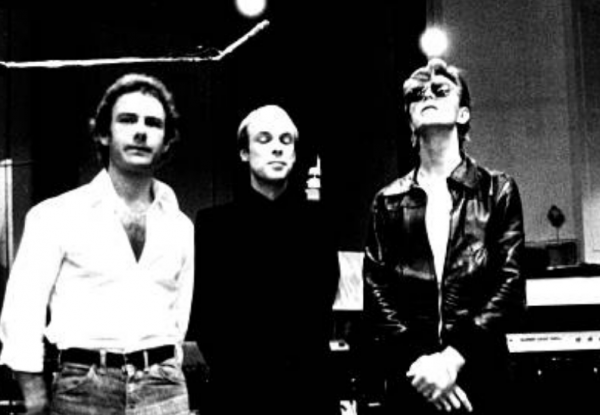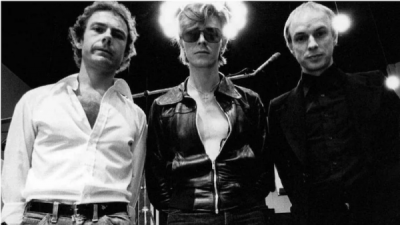As many people have noticed, Robert Fripp recently posted on his Facebook page that “currently we are in dispute with the David Bowie estate and PPL, who refuse to acknowledge that RF is a featured performer on both Heroes and Scary Monsters albums”.
We have been in extensive contact with both parties. Both would probably agree that there is an injustice that should be corrected – but neither will step up and solve the problem, both arguing that it is for the other one to solve.
The centre of the dispute is the credit and payments that musicians are meant to receive for airplay and other uses of recorded music (such as, for example, the regular use of "Heroes" at the London Olympics in 2012). There is a huge injustice in the way that current rules are applied to historic recordings. In particular to those who would now be called "other featured artists" - outside artists who made defining contributions to recordings. This would include Robert Fripp's performances to David Bowie's albums, but could also extend, for example, to Eric Clapton on While My Guitar Gently Weeps, or Duane Allman on Layla.
We argue that such historic iconic performances should rightly be categorised as "other featured artists", as they almost certainly would be if they were recorded today. That category, however, had not been invented at the time - so PPL, the rights organisation, insist on downgrading them to "non-featured artist", an honourable but very large category, where they also place all session musicians and backing singers.
So Robert Fripp's iconic and individual performances on those recordings are, in the eyes of PPL and the Bowie estate, no more valuable than those of an uncredited backing singer.

In Robert's case, this seems a particularly egregious error, as there is abundant evidence from all those involved - the producer, Tony Visconti, the co-writer, Brian Eno, and David Bowie himself (who described the performance as a "duet" between him and Robert). They all on record as describing Robert Fripp's performances as far more than that of a session musician. Even so, PPL are determined to categorise him in that way.
In the case of vocal performances, the rights organisation (PPL) will accept musical evidence of a defining contribution to a historic recording (which would, I think, therefore cover a performance such as Roy Harper on Pink Floyd's "Have a Cigar"). PPL, however, wrongly discriminate against those whose defining and iconic voice is an instrument. In such cases, they refuse to accept musical submissions. They will only allow a historic claim if words such as "featuring Robert Fripp" appeared on the original album - even though that category, and therefore the significance of that form of words, did not exist at the time.
So there is a dispute. PPL and the representatives of the Bowie estate maintain that those are the rules, and point to past injustices as a reason why others should not be corrected. We believe that when a set of rules evidently do not accord with what it is morally right, then the rules should be altered, rather than follow the rules and simply ignore what is right.


The views of Brian Eno, as submitted to and ignored by PPL:

Dear Officials of PPL,
My name is Tony Visconti. I am the Record Producer of 12 studios albums and 2 Live albums by David Bowie. I’ve also produced many single recordings and worked on special projects with David Bowie. He has been my colleague and friend for 48 years.
It is my opinion that Robert Fripp is considered to be a Featured Artist on two of David Bowies very important progressive albums, Heroes and Scary Monsters.
Mr. Fripp was chosen because of his unique style, a total original, as a featured artist in his groundbreaking work in King Crimson and his collaboration with Brian Eno on several albums. Indeed, for Heroes, Mr Eno and Mr Fripp were both invited to add their one of a kind collaboration to that album.
It must be made very clear that Mr Fripp is not a workaday session musician. In Rock and Pop he is an artiste of the highest caliber, the equivalent of cellist Yo Yo Ma in the Classical world. He is a first class soloist and for that reason alone his work with David Bowie on Heroes and Scary Monsters is consider Classic. As the producer of these albums I can testify that Mr Fripp was not ‘told’ what to play. We asked him to invent new parts as only he can for us. We were in awe of what he played, something we could never have imagined.
Featured Artist and Featured Player are terms that were invented in the 1990s by record companies. But it also applies to artistes that played on records back to the beginning of the recording industry from Thomas Edisons’ time. Its absence on a record sleeve can not be held against an artist who is featured on recordings before Featured Artist and Featured Player came into use.
Mr Fripp’s weaving, bending notes over David Bowie’s vocals on the iconic song Heroes alone proves that his counter melody are an enormous contribution to the recording. Without his invention Heroes would be pale shadow of what it is. The same applies to every track Mr Fripp was featured on, instrumental components I consider to be a duet with Mr Bowie.
Ask any Bowie fan and they will say the same thing. I can only speak for myself. If people who represent David Bowie officially deny that Mr Fripp is a Featured based on older album liner notes, I can only guess that their intention is to preserve their self-interests, not Mr Bowie’s opinion of how great Mr Fripp’s contributions to his were.
Yours sincerely,
Tony Visconti, 9 May 2019
New York City

Robert Fripp writes it almost quietly on his Facebook profile, but the echo is that of a scream that pierces the silence. The occasion is a post about the King Crimson Italia group that commemorates the 42 years since the release of the single Heroes by David Bowie. A global success, transmitted everywhere (it was also the theme of the RAI 3 Challenges program just to cite an example), whose distinctive trait - in addition to Bowie's voice - is certainly that unmistakable guitar line that runs through it like a never-ending solo for its entire duration. The unmistakable guitar is that of Robert Fripp, a musician who could be recognized among thousands for his unique and personal voice. The leader and founder of King Crimson comments: "We currently have a controversy with the David Bowie Estate and PPL, who refuse to acknowledge that Robert Fripp is a leading musician in both the Heroes and Scary Monsters albums ."
The statement is resumed today on his Twitter profile also by Brian Eno, co-producer along with Tony Visconti of the so-called Berlin Trilogy by Bowie. It is Eno who, in 1977, following the need expressed by Visconti to find something special to complete Heroes, knowing Fripp well and his way of playing having already recorded a couple of albums with him, he calls him on the phone and says to him point blank: "You feel like coming here and playing some dirty rock'n'roll ?. " Fripp now lives in New York, he is re-emerging from the three-year retreat from the world of music and has not touched the guitar since 1974, but he accepts anyway, and sees that he is delivering a first-class flight ticket to Berlin in no time. At the Hansa Studios, which has just arrived and without even recovering from the jet lag, he puts the jack of the Les Paul into the mixer and improvises his splendid and liquid electric guitar line with the unmistakable deep and sustained sound. Unsatisfied, it affects three versions. Eventually Tony Visconti in the final mixing stage overlaps them all,
Now the point of dispute is precisely the recognition as a "featured performer" - more or less the protagonist in a film - a role that from the point of view of royalty is fundamental and very different from the simple participation as a session musician (PPL plays more in the USA or not the function of our SIAE, with all the necessary differences). The story was explained in detail by David Singleton, manager of King Crimson and partner of Robert Fripp in DGM, shortly before a concert by the band currently touring the United States. The PPL, therefore, informed the DGM that Fripp will no longer be paid royalties as a "featured performer" for Heroes since the production did not credit him, in 1977, as such. The PPL, supported by lawyers for the David Bowie Estate, cites a law on the subject that came into effect in 1990, claiming that it can be applied retroactively even if Heroes was published in the 1970s. It is not taken into consideration that Tony Visconti and others involved in the production of Heroes have always acknowledged that Fripp was a co-author of the song, nor are the numerous interviews by Bowie who affirm Fripp's decisive role, taking refuge behind the fact that the magical formula "featured performer" is not used in the album liner notes.
If from a strictly artistic point of view the question of Friulian ownership may seem truly laughable, so much so, it does not seem to be the case both for those who hold the rights to the works of Bowie today, and for PPL. It therefore seems quite clear that, given the success of the two Bowie albums, those who now take care of the legacy of the White Duke have all the advantages of wanting to degrade the role of Fripp to that of a mere session man, or session musician.























